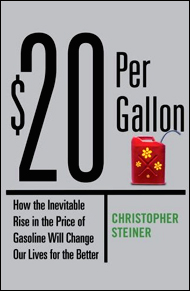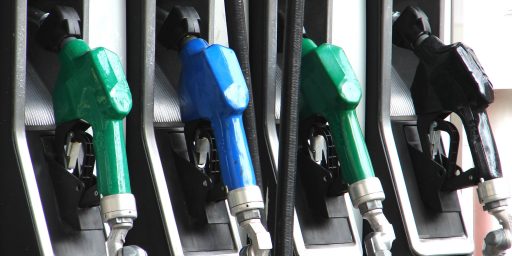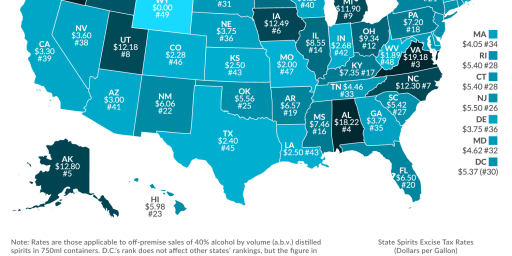$20 Per Gallon Would Really, Really Suck
 Andrew Sullivan gushes over Chris Steiner’s concept of $20 per gallon gasoline.
Andrew Sullivan gushes over Chris Steiner’s concept of $20 per gallon gasoline.
$20 a gallon is about the only thing that could unleash the genius of the market in energy innovation. And nothing else will really do anything to abate climate change. Bring it on!
Now, it’s quite conceivable that the forced innovation would indeed make our lives better in ways that I can’t imagine. For upper middle class yuppies living in our urban centers, it might be really swell.
But the transitional impact would be absolutely devastating for most people. Even Steiner admits that whole industries — from airlines to amusement parks to sushi restaurants — would go under. Almost all homes outside urban centers would be simultaneously unlivable and unsellable. Only the independently wealthy would be able to travel abroad. Essentially, we’d set our lifestyles back a hundred years.
We’re not going to all be in utopian walking neighborhoods in big cities, either. They’re incredibly expensive already and the competition will only increase.
Further, Steiner’s notion that everyone would migrate into “energy-related startups” is an absurd fantasy. Few people will have the intellectual capacity, much less the training and education, to do anything but menial work at the cutting edge of science.






Just curious, but where are all these swells living in urban centers going to get their food and even if they figure that out, how are they going to afford it?
This is first rate stupid stuff here, not even rising to having to worry about the unintended consequences before it surpasses a threshold of utterly ludicrous as anything other than a utopian statist’s wet dream.
charles, the author of that book is predicting $20/gallon gas (by 2029, iirc), not suggesting the price be artificially made that high via taxation.
I just happened to read an interview the other day with the author of the book at the Freakonomics blog. Short version: society will adapt to the shrunken supply if/when it comes to that. More optimistic, less dystopian than the title would lead you to believe. Yet, again, not at all suggesting that gov’t should raise the price that high just to spur innovation.
Anarchy anyone?? Survival of the fittest?? Any idea how to best prepare the human body for consumption?? I don’t like my meat rare, as it is not safe.
Long before gasoline has reached $20/gallon the rise in its price will have rendered any number of alternatives that are technically feasible today economically feasible as well. Not only do I not believe that we have anything to worry about in $20/gallon, I seriously doubt that the allegedly beneficial consequences would even vaguely resemble what Andrew is imagining.
It might well mean that suburban land currently being used for housing might be more valuable as land for truck gardens, as it was 70 years ago. Again, I don’t see that as a catastrophe.
Another question….what’s the corrolation between heating oil and gasoline?. I know much of the Northeast uses heating oil for heat in the winter. The first winter of fuel prices that high may be a cold one for some.
Let’s see before we had oil people did not live predominately in the cities. They lived in the country where they could feed themselves and sometimes sell some to the minority in the cities. Few lived in town until water and other power sources made manufacturing feasible. But urban populations didn’t explode until electricity made plant more feasible. Most manufacturing has been forced out of cities.
Past be damned, jacking up fuel prices is suppose to be useful for those who live in walkable neighborhoods? How? Food production and transportation costs would skyrocket. No one could afford the services these “lucky” in-town people produce so they will be trapped without heat, without affordable food and without a place to go where they can subsist. Those that did make it out to the country would be repelled.
The utopian solar arrays and wind farms will be out in the country. The nuclear plants will be out in the country. The cost of maintaining transmission lines would be high as it requires fuel to operate trucks. The necessary manufacturing would be in the country. The cities are what would die, not the country.
With energy that high and everyone on subsistence living, we won’t need lawyers, computer admins, community organizers, organic co-op managers, artists, actors, non-science professors or anyone who can’t produce something tangible useful for surviving. So how are the lucky in-town people going to make a living?
markm: Perhaps not. I read that the forests of New England are more densely forested than even in the 16th C. I can see town and gown cooperatively marching off to the woods to chop wood. Those folks who lack fireplaces can set up bonfires in the parking lots of their condos.
Apartments with balconies will sell at a premium because that would allow cooking at home, so to speak.
I’m not aware of any electric generation plants currently fueled by wood, but I’m sure we could think of something….
I wouldn’t choose $20 gas, but I see it as doable, if we had to. People who scoff at Prius would buy one. People who gush about sushi would rediscover checken. Heck, maybe neighborhood pigs would come back.
A little creativity would be all that’s needed, but rest easy. $10 gas comes first, and it looks like it is a ways off.
Historical note: Cities got their food by rail, before cheap oil moved things to trucks, and then airlines. The Tons/BTU for trains still rule (for everything short of container ships).
Second note: Those European countries that currently have gas twice as expensive than ours, also score higher on happiness. How do they do it?
(We “want” cheap gas for our lifestyle, but 12 trip/day suburban living might be doing a little bit too much driving.)
For those who think $20 gas is the solution, pay the $2.50 a gallon and send the other $17.50 into the government/oil company/whomever. See how long you still like it.
It might force more people to telecommute. Not a bad thing. We’d ditch our gas guzzlers. Also not a bad thing.
It would hurt tourism. Not good. Food would cost more. Also not good. Except we might eat less which would be good.
I imagine we’d adapt. Go from gas engines to diesel like the Europeans do. Lay more train track. Put more money into mass transit. More people would buy solar panels for their roofs. I’ll bet those changes alone — all off the shelf technology — would cut the impact by half. Even before new tech could come into play.
Are we going to seriously listen to every Chicken Little that comes along?
We could easily convert CNG before running out of oil for gasoline. The recent advances in fracturing assure of us a great supply. Hey! Problem solved. $5 a gallon gas unleashed that technology.
Heck, maybe neighborhood pigs would come back.
This idea appeals to you? Have you learned nothing from history?
I think people tired of paying outrageous prices for fuel would, at gun point if necessary force the government to allow drilling for oil and the use of oil shale in Colorado and Utah. I understand there is more oil yet to be found in the US than there is in all of the Middle East.
It would hurt tourism. Not good.
Depending on where one lives, tourism ranges between 15-20% of the economy. The numbers of unemployed would be massive. Perhaps they could get temporary employment as stoop laborers in giant organic farms that would ring the urban area until the topsoil is depleted.
Food would cost more. Also not good. Except we might eat less which would be good.
Those on fixed or limited incomes would agree. The silver lining would be mass near-starvation would probably take care of the Medicare and Social Security problems as well as making a nationalized healthcare system affordable.
Lay more train track.
The problem with laying more train track is that the people who advocate it are invariably those who prevent it through environmental and NIMBY litigation whenever it is proposed, unless it is a useless “feel good” return to picturesque cable cars running down someone else’s street. In order to achieve economic efficiency, fixed rail transit would require most urban areas to undergo significant physical restructuring so that jobs are heavily concentrated in specific areas.
Put more money into mass transit. San Francisco and the East Bay area is a compact area with a concentrated central employment core, puts massive amounts into fixed and flexible mass transit and continues to lose millions. NYC isn’t doing too well, either. What reason is there to believe that more and more money into mass transit is going to provide some mythical economy of scale to other less concentrated areas?
Go from gas engines to diesel like the Europeans do.
Nice idea, if not for the fact that almost all of the diesel vehicles sold in Europe don’t meet US or California pollution standards. Those diesels adapted to US standards tend to get significantly less mileage than the European versions.
Despite his occasional lucid moments, how long has it been since Sully had any kind of grasp of reality?
The trend towards an increasing proportion of the population living in cities began centuries before the invention of the automobile. The automobile merely accelerated an already existing trend.
But you’re right. In 1900 most people were subsistence farmers. In good years they grew enough to live; in bad years they starved. Healthcare of any kind was rare and what there was was ineffective. Note that no cars means that you can’t get to the doctor in time enough for it to do any good, nor can he get to you.
Most children born died before age 7. Many people died of disease. If you made it to age 30, you had a pretty good chance of making it to 80, working six days a week from dawn until dusk.
Those were the days!
On the one hand sanitation, on the other efficiency.
Semi-city pigs are managed some places, with sanitation. Dirty Jobs (the tv show) went to a hog farm outside Vegas which ate hotel food waste.
Golf-cart level electric cars are doable now, and cheaper than current autos. They would get suburbanites to the shops and the doctor.
There is lots of possible tech that isn’t applied, not because it’s expensive, but just because cheap gas swamps it. I can drive my car a couple miles to the market, or a couple thousand on vacation. It’s the possibility of the long trip that makes the electric option seem goofy.
Yes, odograph, those were the among the points I was alluding to in an earlier comment in this thread. The particular issue I was addressing was the bizarre nostalgia that some people seem to have for subsistence farming.
‘kay. Subsistence bad. Homemade pizza with home grown tomatoes and basil, good.
Randy:
I’d hate to see my former brother waiters reduced to stoop labor. I was hoping they could all get jobs at Starbucks. Waiters love the coffee, and handled just right we could have an entire self-sustaining ecosystem of former waiters and other tourism workers serving lattes to each other.
And see? There is an upside as you point out. We could starve old people. The only flaw there is that old people can live on nothing but soup. And soup remains cheap.
On a more serious note, the new diesels are clean enough for CA, and get staggering mileage. It’s available technology, no breakthrough required, and if we all switched to diesel or hybrid we could partly ameliorate the results of this entirely fanciful $20 gas.
I retract my initial comment. Once the inevitable inflation from President Obama’s trillions of dollars of annual deficit spending takes hold, perhaps $20 a gallon will seem cheap by 2029.
Oh, and odograph, do you have any actual experience in farming? The fuel necessary to transport produce is a very small percentage of the fuel used to cultivate and harvest that same produce, not to mention the manufacture, delivery and application of fertilizers and pesticides. Or do you plan onlaying train tracks down each furrow?
Second oh, and odograph, my practical experience living in Europe and working with many Europeans leaves me to doubt that most Europeans are “happier” than Americans. And even if they are, so what? The Declaration of Indpendence speaks of life, liberty and the pursuit of happiness, not nanny statism, bread and circuses, or the guarantee of happiness — which can only happen by driving expectation down so that hearing, “chocolate rations have been increased to 20 grams,” is treated as something to celebrate. The fact that so many Europeans are willing to trade life and liberty for temporary security does not impress me.
“Second note: Those European countries that currently have gas twice as expensive than ours, also score higher on happiness. How do they do it?”
Happiness – Maybe their standards are lower.
WRT oil and gas – The naysayers have been preaching the demise of oil since the treaty of Rome. Each time more oil was found or technology improved the way oil is consumed. Even now, oil and gas continues to be discovered everywhere.
Of course the man-made global warming scare removes the need to continue with the scarcity meme. Cap and Trade or plain old energy taxes will drive the cost of oil and gas much higher than it is today. And it won’t take until 2029 to get there.
Actually Charles there was a time I was really into this. I tracked down quite a few articles about the “embedded energy content” of our foods. I found it to be lower than the headline scare stories claimed. They’d usually choose the worst food with the worst assumptions, and the present it as an average.
Interestingly, fisheries are the outlier:
I get a kick out of “happiness research” because it is new, even within my lifetime. Based on my reading(*), you are onto something. Obviously people can (and often do) set their standards high enough to never be happy.
I’m also fairly convinced that the walk(**) to the market, moving the big leg muscles, is a biological driver to happiness. Our species was built to be runners, or at least walkers. Physical movement obviously produces a different sense of happiness than showing up at the market in a black Escalade with rims, but … maybe healthier in more than one respect.
* – reading “The Geograph of Bliss” by Eric Weiner now, it’s a fun book.
** – or bike ride
Shorter, which uses less oil: a walk across town for Tapas, or a drive across town to Claim Jumper?
Which produces more GDP?
Which produces more health?
If memory serves, a concept for making synfuels by fixing hydrocarbons from air using nuclear reactors projected breakeven at around $13/gal.
And that’s ignoring synfuel derived from coal, shale, genemod algae etc.
So we can probably take $13/gal as an absolute maximum ceiling; and that is about twice the current retail price including taxes in Europe. Tough, but probably livable-with.
In practice around $5/gal sustained is likely to bring a variety of synfuel sources onstream.
John, the interesting thing about those calculated producer costs is that they don’t (can’t) predict market price.
Imagine a world where oil is so dear that someone actually builds a nuclear powered synfuel plant. Would market price be merely $13? If market price was $20, would the nuke produce enough synfuel to flood the market and drive down the price?
Probably not. We saw this with the Canadian Tar Sands. They came in at higher production costs than predicted, but they certainly didn’t even sell that low. They sold at the market price.
This fiction really isn’t such a stretch. If the government continues to print money in order to fund its budget, we could be making $40 an hour and paying $20 for a loaf of bread (or a gallon of gas) by 2029. Soon the prices would rise faster than cost of living increases and we would be looking for an economic savior to restore hope to our nation.
Oh, wait …
Andrew should come out west. Not for a vacation, but for a few weeks or even months. I’d love to walk everywhere or take public transportation. But out here, driving isn’t a lifestyle choice. It’s a necessity.